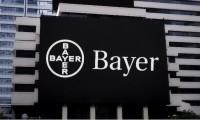-
Bayer teams up with lncRNA-focused NextRNA in $547m deal
- Source: drugdu
- 82
- August 30, 2024
-
Bayer Looks to Expand Kerendia’s Label to Heart Failure After Phase 3 Win
- Source: drugdu
- 69
- August 7, 2024
-
Bayer eyes Nubeqa’s label expansion in prostate cancer following Phase III win
- Source: drugdu
- 67
- July 20, 2024
-
Biotech layoffs strike hard with PMV Pharma, Ikena, and Bayer sacking staff
- Source: drugdu
- 76
- January 23, 2024
-
Bayer CEO Bill Anderson makes his mark with major restructuring, ‘significant’ job cuts
- Source: drugdu
- 188
- January 20, 2024
-
Bayer’s Cost-Cutting Plans Take Aim at Multiple Layers of Management
- Source: drugdu
- 118
- January 20, 2024
-
Bayer wins latest Roundup cancer trial, ending losing streak
- Source: drugdu
- 137
- December 28, 2023
-
Bayer’s stock drops to new 18-year low after asundexian trial termination
- Source: drugdu
- 112
- November 30, 2023
-
Bayer’s trial flop, courtroom setback could restrict CEO’s options amid strategic review
- Source: drugdu
- 96
- November 23, 2023
-
Outclassed by Eliquis, Bayer Halts Atrial Fibrillation Study of Factor XIa Inhibitor
- Source: drugdu
- 125
- November 22, 2023
your submission has already been received.
OK
Subscribe
Please enter a valid Email address!
Submit
The most relevant industry news & insight will be sent to you every two weeks.













